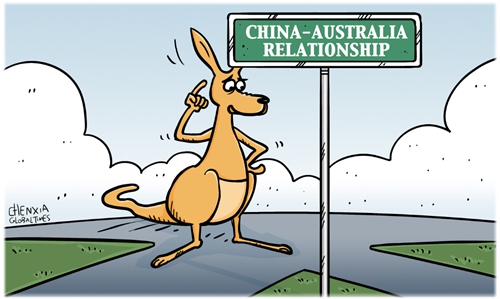Exclusive: Australian universities 'can't wait to' celebrate return of Chinese students after China revokes online study certificate

Melbourne, Australia Photo: VCG
After China reversed its temporary rules in place during the COVID-19 pandemic allowing online courses from overseas universities to be delivered to students within China, Chinese students - especially those enrolled at universities in the Southern Hemisphere - are rushing to prepare for a return.
The Global Times learned that some universities in Australia are eagerly looking forward to welcoming Chinese students and will continue to support those who may face challenges returning to onshore study.
At the time of the announcement by the Chinese education authority, according to media reports, about 50,000 Chinese nationals with student visas for Australia but who had remained offshore are expected to rush into Australia. The new semester of most Australian universities and other universities in the Southern Hemisphere will start in late February or early March.
This will surely help the Australian education sector recover and boost the comprehensive Australian economic development, Chinese education insiders told the Global Times.
The Chinese Service Center for Scholarly Exchange (CSCSE) under China's Ministry of Education issued an announcement on Saturday, saying that it had made the decision to cancel the special degree certification rules during the pandemic in order to effectively protect the interests of overseas students and maintain educational equity.
The center said it will no longer recognize overseas degrees obtained via online learning except in special circumstances, and it urged students to return to their overseas campuses as soon as possible.
"We can't wait to celebrate the return of our students to campus for Semester 1, and are planning accordingly," a spokesperson of the University of Sydney told Global Times on Monday via email.
The spokesperson said that the university staff expects the vast majority of students, including international students, to be on campus for the Semester 1 (February 20).
The spokesperson noted that the school is aware of the logistical challenges for the students, particularly around visa processing, travel availability and accommodation, and they will continue consulting with the sector, governments and providers as required.
The university will also continue to provide remote offerings wherever possible for offshore international students who are unable to return to Australia. However, the delivery of on-campus units remotely will be banned and pre-pandemic face-to-face teaching modes will return from September 2, according to the spokesperson.
Also, Professor Sharon Pickering, deputy vice chancellor (education) and senior vice-president of Monash University in Australia, told the Global Times on Tuesday via email that "we welcome China's decision to encourage students to return to Australia and will work closely with the Australian government to ensure their smooth return."
"International students are an important part of the Monash community. Not only do they provide a global perspective to our entire student experience, they add vitality to our campuses, and to the broader Victorian community," the university noted.
"We're really looking forward to welcoming all our students back to our campuses next month, so they will be able to engage with other students and staff face-to-face and make the most of all that campus life has to offer," a University of Melbourne spokesperson told the Global Times on Tuesday.
A spokesperson for the University of Queensland expressed similar anticipation for welcoming the return of international students to campus and will continue to support students who may face challenges returning to onshore study.
During the pandemic, the loss of Chinese students was a great economic shock to Australia, which is suffering from severe stagflation, and the return of Chinese students may be the "key to recovery," Chinese observers pointed out.
International education is Australia's fourth-largest foreign exchange earner, and China sends the largest number of international students, media reports have said.
Last year, Australian universities faced severe financial difficulties and had to reduce pay, cut teachers and employees, and drop some disciplines, Chen Hong, president of the Chinese Association of Australian Studies and director of the Australian Studies Centre at East China Normal University, told the Global Times on Wednesday.
Chen listed some of the main factors behind the strong anticipation from the Australian education sector to welcome more Chinese students back.
More than just boosting the international education industry by paying tuition fees, Chinese students can bring comprehensive economic benefits and social development to Australia through hospitality consumption, travel, accommodation renting and home buying as well as working after graduation, Chen said.
Australia has long been one of the top destinations for Chinese students due to its fine education quality and cultural diversity, the observer noted.
A 26-year-old postgraduate student surnamed Tong of the University of Sydney is busy booking a flight and student accommodation after learning of the notice from the Chinese education authority. She told the Global Times that she was a bit pressed for time but hopefully she could arrive in Australia before the start of the new semester.
A couple of other Chinese students of Australian universities expressed their excitement at taking face-to-face courses, but they also noted the time constraints to go through the procedures.
After learning of the challenges, the CSCSE made a further statement on Sunday offering some more flexibility for students returning to Australia and other nations.
For example, an exception is being made for Chinese students who have too little time to apply for visas, book flights and accommodation if this semester is about to start or has already started.
The center said those students can continue online courses while going through the procedures.
In case of visa rejections, flight cancellations or inability to make dormitory reservations, it is recommended to keep relevant documents and submit them with the degree application for certification, so as to successfully pass the certification, said the center.




